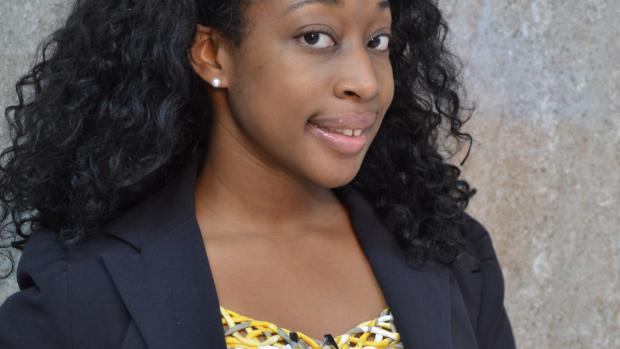Meet Stacey Johnson: Engineering a Legacy

It’s hard to catch Stacey Johnson sitting still. She carries a full course load, works in the Department of Online Learning, and parents her six-year-old son, Aiden. Not to mention her efforts with the NYU Polytechnic School of Engineering chapter of the National Society of Black Engineers (NSBE), a group she credits for much of her success and happiness as an aspiring engineer.
“When I am at a NSBE meeting, I see other students I can identify with,” she says. “These are students who commute like I do and whose families and friends, while they might be supportive, sometimes have little idea how much work and effort goes into earning an engineering degree.”
Johnson’s own family moved to Brooklyn from Kingston, Jamaica, when she was two years old, seeking educational and economic opportunity. While she is not the first in her household to attend college—her mother has an advanced degree and works in the education field—she is the first to pursue an interest in a STEM-related career.
“I’ve always loved math and science, and I excelled at physics and calculus,” Johnson recalls. Still, she did not consider a career in engineering until taking an assessment test given by a high school counselor. “To me, an engineer was just someone who drove a train,” she laughs. “I had no idea the wide variety of careers available.”
An ardent fan of Six Flags Amusement Park and its roller coasters as a teen, she hit upon the idea of designing those rides for a living and decided to major in mechanical engineering. She initially attended Lehigh University, in Bethlehem, Pennsylvania, but after the terrorist attacks of 9/11, she felt an urgent longing for the city, extended family, and home.
Upon her return, she took a series of accounting and administrative jobs but found them largely unfulfilling. “I would get excited when I the new issues of Popular Science and Scientific American came out,” she explains. “I loved reading about new discoveries and research.” One day in early 2011, during her commute to work, she impulsively called the admissions office of the NYU Polytechnic School of Engineering. “From that very first phone call, everyone here has been exceptionally warm and welcoming,” she explains. “I was invited to interview and was subsequently offered a scholarship. When I attended an event hosted by Dean Anita Farrington and heard a keynote speech by a black, female alumna, it reaffirmed my decision. I knew I would be comfortable here.”
Although she is, at times, the only black, female student in some of her classes, she has maintained that level of comfort, thanks in large part to the strong web of support she has found here. In addition to Dean Farrington, her biggest boosters have been Valerie Cabral, the director of Alumni Relations; Rose Sterling, from the Wasserman Center for Career Development; and everyone at the Office of Special Services. “I can’t stress enough how important it is to have a strong support system in place,” she says.
“As black women in STEM, it’s natural for us to feel we have to be strong and blaze trails. But we don’t have to do it alone. There are a lot of people who want us to succeed and are very deeply committed to helping us succeed, at the School of Engineering and outside of it.”
Johnson counts among her mentors her supervisors at the internships she has won as a result of her experience and involvement with NSBE. “As I got older, I abandoned the idea of designing roller coasters and am now focused on aerospace engineering,” she says. “I’ve interned at Sikorsky, the company that makes Black Hawk helicopters, and Boeing. In fact, I’m headed back to Boeing this summer for a second internship."
It’s not just her professors and employers who are taking notice of all that Johnson is achieving. “My son, Aiden, is very proud of me,” she says. “He thinks he wants to be an aerospace engineer when he grows up."
Asked what advice she would give to him -- and to other aspiring engineers from groups underrepresented in the STEM fields, she says, “The most important thing is to remember that you can do it, no matter how difficult it seems. Don’t let anyone tell you that you can’t. Prove them wrong.” She continues, “We are all capable, and we each bring something of value to our team. If you are female, you bring that perspective; if you’re from a cultural minority, you bring that unique perspective. The most effective teams are inclusionary and diverse and will consider you a great asset.”




